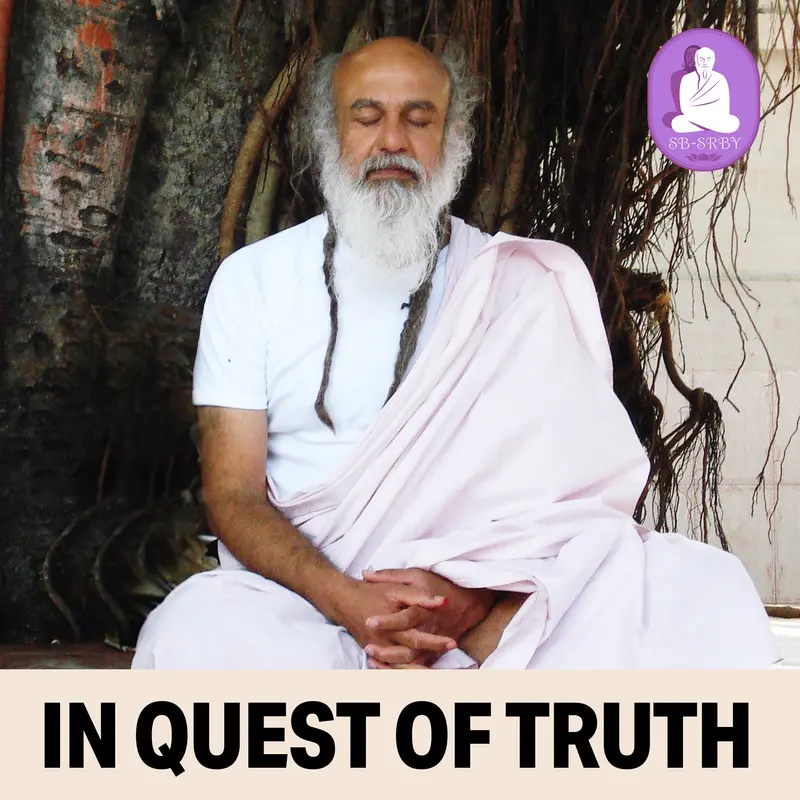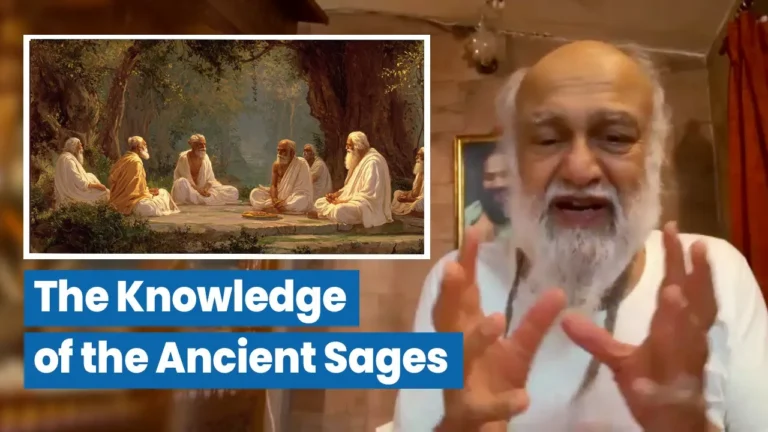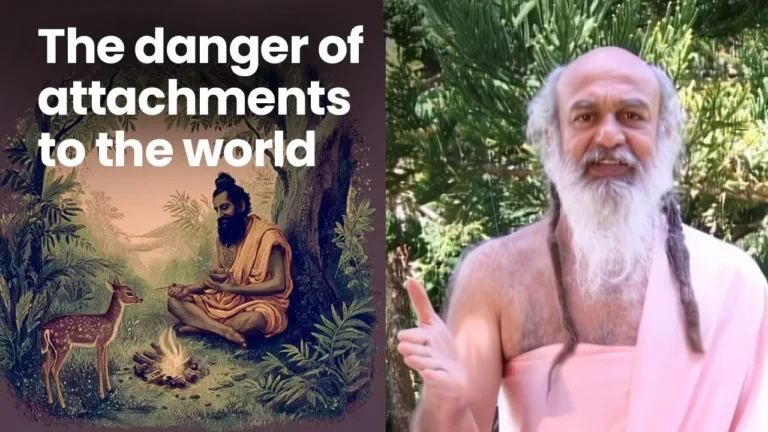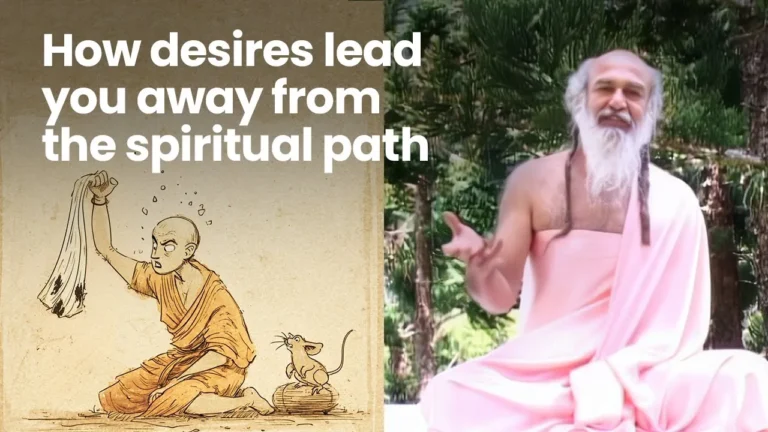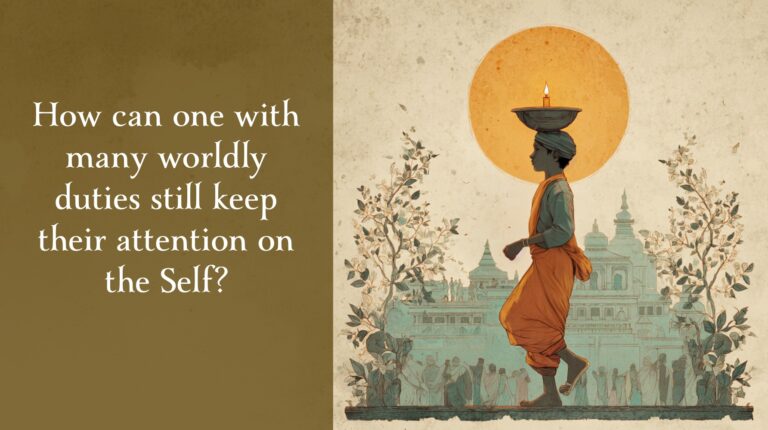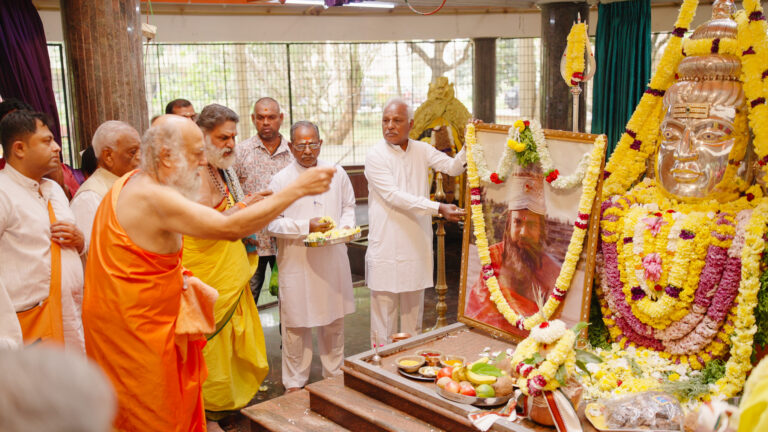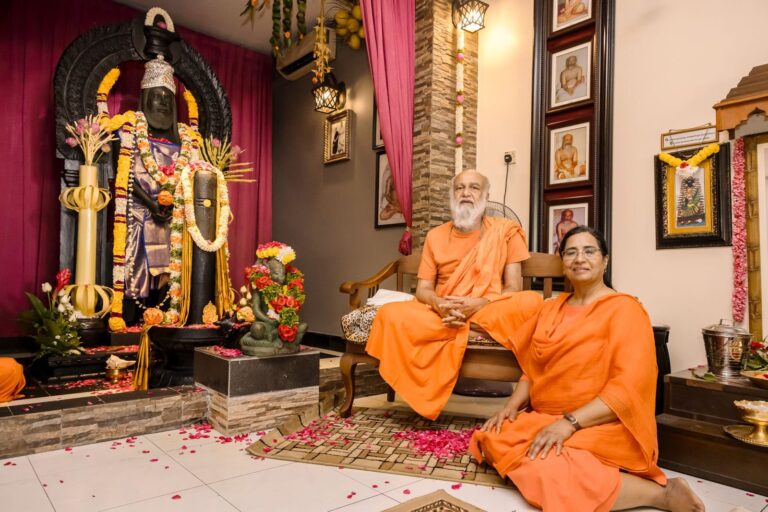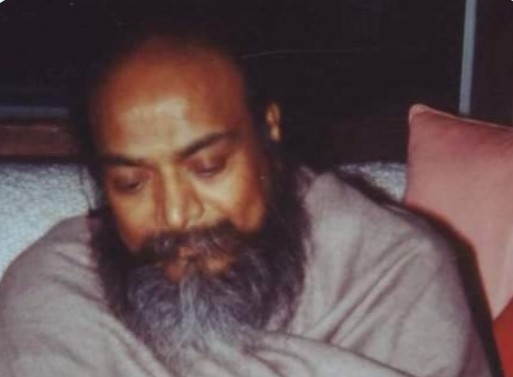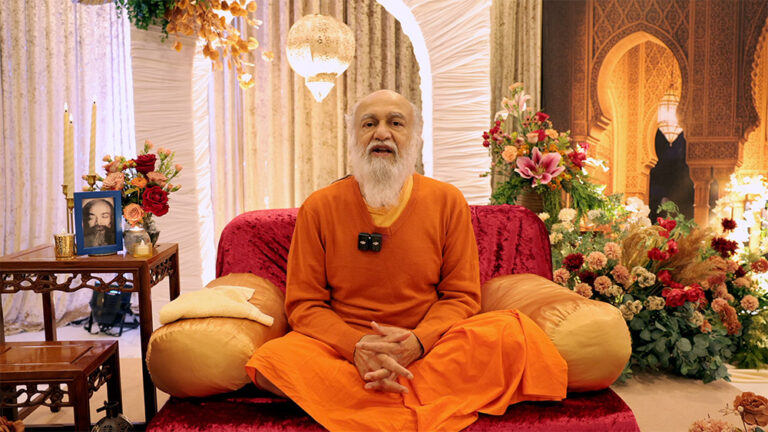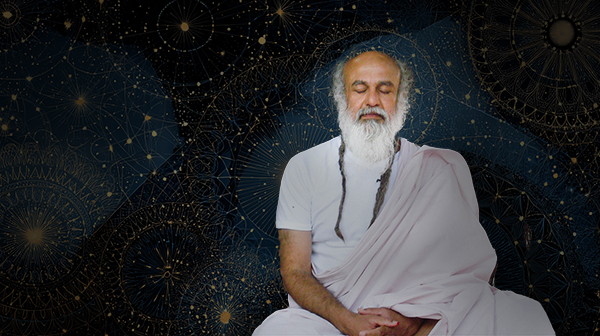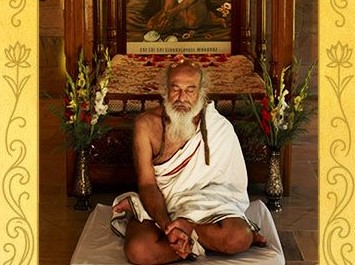Recorded on 24 September 2022 with worldwide participants
0:00 Intro
0:30 What should we do for the rest of the day outside meditation?
3:02 Is there a need for any other sadhana if we practice meditation properly?
4:52 Through meditation we don’t absorb impressions so much, is this something we consciously need to do or is it an automatic thing?
6:06 Our three-fold obligations that Swamiji spoke of
11:05 What are emotions?
16:26 If the mind has goes into an extreme emotion, at that time should we try to bring it under control or is it too late?
17:22 Are emotions related to the six shapes of the mind?
19:18 What does Babaji mean about sublimating the emotions rather than suppressing them?
20:33 How do we serve with humility the old who needs care, who refuses a spiritual outlook and tries to be self-destructive?
21:54 When struggling with a deep emotion, how not to get caught up into it in that moment?
24:18 At the time when Swamiji left His body, how did Babaji manage to do sadhana during this intense grieving period?
26:06 What does it mean to apply the mind to the brain?
27:30 What are the vedas and connection with Brahma, Vishnu and Shiva?
29:28 With constant practice of meditation will the mind not get into the six shapes of the mind?
32:13 When we don’t feel well and struggle with concentration should we still sit for meditation?
33:27 How to overcome intense emotions that come up out of the blue?
35:02 Is there a value to having a positive emotion in meditation?
41:58 How to overcome fear and paranoia
Sadhana and Emotions, Thus Spake Babaji, online Q&A #109
24 September 2022, Worldwide Participants
Questioner:
Thank you, Babaji. Thank you for giving us this time in Babaji’s busy schedule, to give us Darshan and His teachings.
Baba, the topic for this evening is planned to be about sadhana and emotions.
Firstly, about sadhana, Baba.
Babaji has instructed us to practice meditation each day for at least one hour. Could Babaji give us please some guide about what we should do for the rest of the day?
Babaji:
You see, you may have adopted a way of life for yourself. Say for example, you might be having a job, or you might be doing some business for your livelihood, and you might have married, and you may have some family responsibilities, etc. All these things are there, plus the body also needs rest and some food. So you can take out for twenty-three hours all these things.
That’s what Swamiji used to tell. One hour you meditate. In that one hour, just to try to meditate and don’t do anything else – mentally, physically. Physically, you have to sit quiet, unmoved, is important. Then, gently keeping the eyes closed, concentrating the mind and sight in between eyebrows, and just watching there, keep watching there.
When you keep watching there, you don’t have to do anything. If any thoughts or visions come don’t get excited, don’t get disturbed, either way. Even if God appears, just keep watching God and nothing else, you don’t have to do anything else. So like that, you use the scene, or any vision that might appear, or any thought, just to remain focused. Thus, you will be able to practice silencing the mind, that is the most important thing.
So this can take care of your mind for the next twenty-three hours, if you thoroughly, sincerely, understanding the technique if you meditate – then for twenty-three hours you can have that peace, and your mind will not absorb any imprints. That is also very important, that mind should not absorb any further imprints. Like, on a white paper you write, and instantly it should get erased. So that’s what – it is becoming quiet. Its agitations all get reduced, no more agitations are there, like that, that is the improvement.
So that’s what you can do. If you do for one hour, that is the benefit. All the other twenty-three hours you can handle very well, in a more matured way, as a matured human being.
Same Questioner:
Thank you, Baba. So Babaji says that it’s enough to practice only the meditation, and there’s no need for any other sadhana if we practice the meditation properly?
Babaji:
Yeah. If you thoroughly practice, and if you have understood the technique – if you are able to remain quiet – there is no need for any other sadhana. Because, when your mind becomes quiet, as I have earlier told, that goes towards its God, Divinity, it merges with its Real Self, that One Single Self that exists, that’s what will happen. It will get connected to at least – if not immediately the merger, the merger will take time – but it will remain connected. So there is no need for any other sadhana.
Any other sadhana is done for keeping the mind focused, single-pointedly into… like one thought, ‘There is one God, we have to do some mantra, some repetition of mantras’ – any such thing which is also not necessary. Because mind if it becomes quiet, it goes towards Divinity only, it has no third way. If it is into imaginations, it will be in the world – if its imagination stops, it goes introvert. That’s what will happen.
So there is really no need of any other sadhana, unless one has the inclination, or keeps missing, or on and off develops doubts, ‘If I am not doing will it be all right, is it the wrong path?’ So many doubts keep coming in spite of us assuring and telling – one Guru, one word, and one mind they don’t keep. In that case only you do, otherwise really not necessary.
Same Questioner:
Thank you Babaji.
Babaji had spoken about if we meditate properly, then we won’t take on impressions so much. Is that something that we consciously need to do, or does it automatically happen that we don’t take those impressions on?
Babaji:
If the mind goes on becoming quiet, and quiet in the practice of the meditation, then automatically it won’t absorb an imprints, it will get erased.
Because when it becomes quiet and quiet – it is trying to go introvert, trying to go introvert – so thus it won’t absorb any imprints, it won’t get involved with any of the imaginations. Even due to the brains reflections an imagination occurs, but the mind will not absorb any impressions, imprints also, what we can call that one.
So thus, this one hour meditation can be so helpful if the technique is understood and if it is done in a proper way – silence your mind, and that’s it, that’s good enough – it automatically would not absorb. It’s like on a white paper you write, and it gets erased instantly on its own, there is no separate technique that you have to do anything.
Same Questioner:
Thank you Babaji.
Babaji has sometimes spoken about how Swamiji described our three-fold obligations or duties. Could Babaji please describe those different types of duties that Swamiji spoke of, please?
Babaji:
Ah, He used to say, ‘Having born as a human being, you have triple responsibilities.’
One is, you need to take care of your physical body’s health. It is important. If it is healthy, then it can be so helpful in sitting for one hour, and then you can raise it to another hour, another hour, whatever that is possible would be possible. If you lose the health, then it gets affected. It will be painful, some trouble will be there, some weakness, anything can happen. So that’s why taking care of the physical health is the first part of the responsibility, or the first part of the, what we call it as – religious duties. This is what.
And using this body only we can control the mind, purify the mind, make it silent will be possible. Then only we can catch hold of the mind. Because the brain is in touch with the mind, and it keeps drawing the mind. That mind you will be able to feel it – when you close the eyes and there is a ‘consciousness of existence’ – that will not go. There will always be a feeling that you exist, that ‘I-ness’ will be there.
It is a different thing. Further you would have named and identified in so many ways, ‘I am a doctor, I am a general, I am this, I am a businessman,’ anything like that, in so many ways would have identified.
But all those things are not that ‘I’, consciousness of existence – it is beyond that. Because when you become totally silent in the mind, then that becomes visible or revealed, then you will be able to know about that. That how you exist as the Immortal Soul, beyond the birth and death of the physical body.
This is the second thing. Means, mind control. Using the physical body the second responsibility – you have to take care of the health of the mind.
Health of the mind is many folds. You see, if it thinks, it should be able to think of a larger cause, then it becomes a mature human being-type. So always welfare of the world, welfare of the Mission. Sometimes, and many times, we have to take decisions sacrificing our own ego, and take decisions based on the welfare of the Mission, a larger cause, Ashram, institution or the country, society or the world, like that. We always pray that the world be happy and at peace, may all beings in all the worlds be happy. This is the thing, when the mind is mature it won’t think of selfishness and narrow-mindedness, would disappear. It will become mature, and it will think of a larger cause always. This is the second thing.
When the mind is so matured now, it is able to uphold moral values. Again, moral values is the same – thinking of a larger cause, giving up the selfishness, narrow-mindedness. We won’t make any judgment based on our own imaginations. We will leave it for a while, and try to watch and observe more thoroughly before taking any decision, before arriving at any conclusions in the mind. That’s why it is also important.
Then we can uphold the moral values – a consideration to each other. If I am hungry, others are also hungry. If I want to be happy, all others want to be happy. So instead of fighting, if we all come together, and work out such formula that all of us can live peacefully, happily, how wonderful that would be. All humanity, all the world be happy, if only everybody can meditate. If one meditates and a hundred don’t meditate, then it’s of no use. Those a hundred will not listen to the advice of the one meditator. They will do according to their selfishness. So it’s very important that others also cooperate.
So, Swamiji spoke of these triple responsibilities, having been born as human beings – taking care of the physical health, mental health, and moral health – these three things. In fact, Swamiji used to say, this is what religion means. A religion has been taught since ancient times for this purpose only, so that you can take care of your physical health, moral health and mental health, all these things.
Thank you, Babaji.
Babaji, one of the other topics we wanted to discuss if possible this evening was about emotions. Could Babaji first describe what are emotions?
Babaji:
Emotions are the feelings that get generated in the mind by registering the brain’s reflections. This is what is my opinion. So at that time, if the mind is under your control, then you can understand better, if necessary restrain yourself. Because, sometimes emotions can be your strong and positive point, and sometimes it can be your weakness also.
Like, for example, suddenly you might lose your temper just for no reason, by misunderstanding a situation, misunderstanding a person, and make a decision, ‘This is it, this is what really happened.’ No matter how much you try to explain, such a person won’t accept it at all. So that is the immaturity, and that is what happens; emotions when you don’t have control over your mind.
If the mind is under control, we will think twice, we’ll think ten times what would have happened. If I was in their situation what would I have done? If I had done this wrong thing like this, I would like to be forgiven. So that’s how Jesus said, ‘They know not what they are doing, forgive them, my Lord,’ He prayed to the Divine, Divinity. So that is the emotion’s sum; it can be your strength, and it can be your weakness also, either way.
Suppose you become emotional on a Self Realized Guru. And you become attached. And you don’t look back till the last breath of life. And then you can achieve Self Realization also. This is a positive emotion that you fall in love with the Master, with God, with Self Realization, and never look back. You will never try to judge the Guru, never try to see what the Guru is doing, what is the purpose. There might be some purpose if the Guru is doing something – to one student He might be scolding, another student He might be giving sweets. So they needed that thing at that time. That’s what a Guru does, Guru knows what it is. But His love is same for both of them. To one where He gives sweets to a disciple, to another where He gives some scolding – He loves both of them – He wants both of them to rise about the level of misunderstanding, and ignorance, and achieve the Self Realization, achieve the spiritual Truth. So that is how emotions can be your friend, and it can be your enemy also.
If you don’t have control over yourself, then you might be doing a wrong thing. So this is important, that you always have control over your emotion.
This becomes possible when you meditate regularly for one hour. You will see that you will overcome all emotions, and will be able to apply your wisdom in a much better way. You will be able to understand the situation quickly, you will be able to visualize what is happening, ‘why is this,’ like that. If still you cannot do anything, accept it graciously, that is all. If you can do something, do it. So that’s what it is. Two countries keep warring. Nobody wants a war. We try to stop it. But both don’t listen and go on fighting. You cannot help. At least you keep yourself restrained that you don’t get involved.
So this is the thing about emotions. It can be your positive, it can be your plus point, or it can be your minus point. You fall in love with the Master who is Self Realized, then you don’t look back, you don’t try to analyze in any way. Whatever the Guru does, it’s fine. For me, He is Self Realized. And I want to get Self Realized, and I want to do meditation, what He prescribed – what He taught – that is what the importance is. If we decide in a negative way, so those emotions could be ruining us unnecessarily, we might lose the path, we may not get into it for so many lifecycles. Swamiji used to tell, ‘When you lose the path, for 55,000 lifecycles you may lose the path.’ Again if you have to come back, and become as a human being, and then find a Guru like that who is Self Realized, it will take time. You are wasting your energies just by making a judgment.
You think that you are the most wisest person, but you might be the most foolish person also, you might be doing. So like that emotions can play havoc, can be helpful, either way. Whatever it is, it is necessary to keep your mind under control, yourself restrained. Then automatically you can keep your emotions also restrained, and you would be able to understand in a better way.
Same Questioner:
Thank You Babaji.
Babaji, if we find some time during the day that the mind has gone out of control, or into jealousy, or anger, or some other emotion, is it useful at that time to try and bring it under control, or is it already too late, it’s gone?
Babaji:
No, it’s always useful. Even if it’s late – better late than never – that is the old saying, that type. You can always try.
Try to take a long inhale and exhale of the breath so that the restlessness of the mind comes down, you can cool down. Then you will be able to see reason, and you will be able to behave in a better way probably. Otherwise you will go on behaving in an immature way, and emotionally driven you might be committing mistakes, and go on doing wrong things, and wrong things. So that’s what can happen.
Same Questioner:
Thank You Baba, thank You Babaji.
Babaji spoke earlier about emotions being related to reflections from the brain. Are they related in any way to the six shapes of the mind, or is that quite a separate thing – Arishadwarga.
Babaji:
Mind always takes one of the six shapes. That all six shapes the sages have explained, that is what the mind takes shape. Emotions also comes under any of this.
When you lose temper and get into an extreme anger, then also it is emotions. And when you lose temper, become very greedy, then also you lose your control over the mind. And you get attached to the material world of the imagined self, that ego, and surroundings, the society, like that you become egoistic. So that is also a danger. These emotions can be troublesome like that one.
And false pride. You might get into false pride, ‘Oh, why should I be listening to any of them? He is no more a Guru, he is no more my Father, he cannot be my parent,’ like that. A person can lose respect or interest, anything, and try to do their own things. And they will go berserk and mad. They will try to influence each and every one onto this path. So that’s what happens. They will be the loser, they will make others also to become losers if they are emotionally attached to each other. In the society this happens, suppose a group of people do it. So that’s what happens many times. So that’s why it is important.
Also, false pride and jealousy.
So these are all the six shapes – are all under this only, the mind going into extreme emotions.
Same Questioner:
Thank you, Babaji.
Baba’s sometimes spoken about sublimating emotions rather than suppressing them. Baba has sometimes said that suppressing is not good, that the emotions and the thoughts should be sublimated. Could Baba please explain that a bit further?
Babaji:
Yeah, sublimating means – you have emotions, try to turn it positively, think positively towards.
Like for example, my Guru scolded me. So would be upset for a while, but I would turn it into a positive energy, ‘Swamiji, now you have scolded me, now I will love you more. You cannot make me not to love you. Simply that is my job, I will love you, that’s all. I don’t know anything else. I don’t know about ego, I don’t know about my personal things, I don’t know about my selfishness, I know only my Guru, Swamiji, and I will love.’
So like that it can be sublimated, that anger can get sublimated quickly, if you are used to, if you practice – if you have really fallen in love with the Master – if you have that wisdom application, so that is what is important.
Same Questioner:
Thank you. Thank you, Babaji.
Suchetana has sent in a question, Babaji. How do we serve with humility the old who needs care but refuses any spiritual outlook towards living, and tries to be self-destructive?
Babaji:
You can try – because you can change yourself but may not be able to change others unless they also cooperate. A doctor cannot cure a patient if the patient doesn’t cooperate. Like if the patient refuses to take medicine, and if the patient doesn’t follow the instructions of the master or the doctor, then the doctor is helpless, cannot do anything.
But whatever happens in life, you keep yourself intact that you don’t lose the path, you don’t lose that determination, dedication, and discipline. So like our teacher said, when she was teaching used to say, ‘I don’t know whether you will learn or not, and I try to teach you so that my practice is intact.’ So that is the thing. You don’t give up, you try to keep doing, that will be helpful to you. That will make you more firm – in your attitude, in controlling yourself, in becoming more mature.
Same Questioner:
Thank You, Babaji.
Babaji, Ayla has sent in a question which Babaji has already dealt with in His talkings, but I’d like to ask it again, if I could please. Ayla asks, ‘I’m struggling with a deep emotion that arises every so often around a similar situation. And when I’m in that emotion, I can’t seem to witness it, or see it as separate, or just calmly watch it pass. It’s so intense, I just fall into it and get caught up in it. What in that exact moment of heated, painful emotion should I do to try to transcend that emotion?’
Babaji:
First thing, firmly stick to the goal that you want spiritual truth. For that spiritual truth, you must be ready to sacrifice any ego, anybody’s behavior, anything.
Like whatever happened… in today’s world for a smaller thing, for just for nothing, by a misunderstanding, somebody can lose faith in the Guru, and lose the devotion, but how we behave, whatever happened – we don’t give up the Guru – we love. Because we know that He has that Ultimate Truth that we need. That is what we need, for that we are ready to sacrifice our own ego, we are ready to be in humility, that is important. So like that if you can adopt.
So always, when something happens, what is it that you want most? You have to weigh, and choose that one. If the Self Realization, if God, Guru, these things are more important than any other ego, it’s simple to sacrifice the ego and remain attached to the Master. It’s like this. So simply you have to remain attached, and think again, and again, ‘Master has got what I want, I’m not going to give up. I will love Him more. Even if He cuts me into pieces, no problem, I will simply love Him’. So that becomes a self-respect for us. We cannot give up the love for the Master, that is like a self-respect. ‘I cannot go down in the self-respect’ – so like that if you can hold on to the emotion, then you can win always.
Same Questioner:
Thank You, Babaji.
Babaji, Kalpana has sent in a question while we’re waiting for others to join. She asks, ‘At the time Swamiji left His physical body, how did Babaji manage to do his sadhana in such an intense grieving period? How does one instruct the mind that the physical body will go one day? We’re just human, and we’re very attached to our Guru. What should one do in such a situation?’
Babaji:
See, that grief was only for a while. Because of long time practice of meditation thoroughly, we could quickly regain our peaceful composure, all this and maturity of the mind, and understood, ‘Yeah, it is only the physical body that has gone. As the Divine our Swamiji is everywhere, He is always with us.’ This we must experience more vigorously, more deeply. Simply by crying and grieving, nothing will change, Swamiji’s body will not come into existence. Otherwise we might simply get emotionally fooled by somebody. That is important.
Like that we thought and recovered, and quickly went to the mountain and tried to do meditation, then came back to Dehradun Ashram, and the Divine also Graced upon me, and we went for the Tapas. So that is important.
Like that, we quickly overcame. That was important. We didn’t allow – because of the long practice of meditation and the spiritual exercises that we were doing, it didn’t trouble us for very long time. My Swamiji is in my heart. So that’s it simply.
Same Questioner:
Thank You, Babaji.
Questioner:
Pranams Babaji.
Last week I asked a question about the brain reflecting anxiety to the mind. And if I understood correctly, You told me to practice applying the mind to the brain. And I think that’s what You’re talking about here also, but I just think I need it said a bunch of times to really get it. So I guess I’m wondering what it means to apply the mind to the brain?
Babaji:
Actually if you are practicing meditation, you can know that all the time your mind, means you will be under your control, nothing can really bother you, means. Even for a while if it happens, you will be able to withdraw the mind actually to its composed position back, and then remain unaffected by the brain’s reflections.
Brain is like a computer, it simply reflects, it cannot think like human beings, whether ‘I should reflect this, or not reflect that’; it won’t have any thinking. So like that, if you adopt that method, and continue your meditation, you will be alright. That emotion that rises in the brain, it won’t affect you.
Same Questioner:
Thank You.
Questioner:
Pranams Babaji.
Babaji:
My Blessings.
Same Questioner:
You have spoken before about how Brahma, Vishnu, and Shiva are beyond maya, beyond imagination. And then there’s also the Vedas, which are said to be Apaurusheya, Nitya, eternal, and uncreated. And what is their connection to Brahma, Vishnu, and Shiva, what are the Vedas?
Babaji:
Vedas are the teachings that came out of the Divinity, and the sages when they did Tapas, they spoke about their experiences and gave opinions. So that is Vedas and Upanishads.
Upanishads are where they have spoken about the Self, Supreme Consciousness, all these things are the Upanishads. The sages have spoken these things. Whereas Brahma, Vishnu, and Shiva are above this also.
Same Questioner:
The Vedas, there’s said there are four Vedas: the Rig Veda, Sama Veda, Yajur Veda, Atharva Veda, these mantras, which don’t seem to be actually teachings like the Upanishads, so what is their role? They’re what is said to be eternal, and from creation to creation.
Babaji:
Ah, you see, I’m not a big scholar about Vedas, but somewhat, a little bit what I can say is, they talk about the duties of a householder, of a king who rules, of a subject, of a citizen, everybody’s rules. Children’s law rules, how they have to behave with parents, and parents how they have to behave with children, like that. It is mostly spoken about the duties when you are born as a human being, so that the society, country, and the world can be healthier.
Same Questioner:
Okay, thank You, Babaji.
Questioner:
Pranam Babaji.
Babaji, when You describe that with constant meditation we control our mind, does that mean that our mind will not get into such emotions, that the six shapes of mind do not occur with constant practice of meditation? Or is it that we manage to control it, we will feel jealous, we will feel greed, but we will control it?
Babaji:
If you do a Tapas then these things won’t affect at all. Your mind will be in silence and quiet, it will never get affected. But outside you might show if the society requires, if the surroundings require. That doesn’t mean that you have that weakness. I might use an anger, I might use a particular language. That is for the benefit of the disciple so that they lose karmas, they don’t get affected by their behaviors, wrong behaviors, all these things can affect. So that is all. Otherwise, a Yogi doesn’t get affected by these emotions. He’s always in the Sahaja Samadhi.
Same Questioner:
Babaji, for laymen, if they feel these emotions and they’re trying to constantly practice meditation and not feel it, it’s my personal experience I start reprimanding myself that why did I get into this whole cycle, because I have been instructed that with constant meditation you should not get into the whole practice of being affected from all this, and when you do you find yourself weak. So how to overcome that pull-and-push?
Babaji:
You don’t have to feel weak. Then you, means reprimanding, you don’t have to lose temper. Simply you need to correct yourself – rectify your mistakes – then you rise above that level. That is what is important.
These two have a thin edge of difference. Reprimanding yourself simply like taking a cane and hitting yourself has no meaning sometimes. So the mind may not change, it may go into a depression, or any such thing, ‘Oh, why I did like this.’ Instead, ‘Oh, this was a bit wrong, I need to correct, now let me present myself in a better way.’ Like that if you think. And then simply rectify your fault, that is what is needed. You don’t have to be ashamed, and you don’t have to lose your peace, or composure, anything. Simply you just try to understand, ‘Oh, this was not proper. So let me rectify myself. Next time I will not behave like this.’ Like that if you think, that is more better, positive.
Same Questioner:
Thank You Babaji.
Questioner:
Babaji I’m not feeling well. I’ve been having a cold and cough. And I’m not completely sick, I’m able to function. But when I sit for meditation, I feel the mind is not concentrating, and it’s full of thoughts, I’m trying to ignore the thoughts, but I don’t feel like I’m going completely into the silence. So should I still sit?
Babaji:
Still sit down, try. Struggling, or taking a challenge is better than simply giving up like that. And if at all this silent meditation becomes more difficult at least you can chant any mantra, name of God, and try to talk to God in your mind to help you, to bless you. Or you can fight with God, why He has made you like this. Like that, you keep doing that one.
Continue sitting, continue sitting, whatever is possible, in whatever way. If necessary, you try to recline a little backward onto the wall so that you feel better and comfortable. But don’t give up.
Questioner:
Namaste Babaji. Hi.
So when I meditate, I’m getting these thoughts and emotions of, you know, like getting angry, and then jealousness, and passion, and these kind of imaginations are suddenly popping up. Even when I’m idle actually. So how to subside these things? Will it take time, or do I have to follow anything else other than practicing regular meditation?
Babaji:
Try to give some time, it will come under control. Meditate, and also assure yourself, remain positively, any such thing comes it will be alright.
Because, one thing, it is there since long time immemorial. That’s why it will take some time, that habit is there for long, long time. So for it to take, so you just put an effort, and take the challenge. Try to keep quiet. When it comes try to keep quiet, when it comes try to keep quiet. Let it come, that is its habit. You try to keep quiet, make it your habit eventually.
So like that, then eventually things will become smoother and easy. If you just think that just by giving up your patience, and getting into anger, you are losing your precious time, your precious vital knowledge, and that achievement that you have to do, is stopping you. So that’s how if you think like that, you can overcome soon.
Pray to God also like that. Prayers can be very helpful.
Same Questioner:
Okay Babaji, thank You, thank You. Thanks.
Questioner:
Yes, thank You. It’s always a pleasure to be here. The great part of the gift of being alive is to be at these sessions with You.
And I want to bring this back to the original question for the day, which is on emotion and sadhana. And there’s people who are always in a good mood, or who are always giving out positive emotions. And there’s people who give out negative emotions. And in our meditation we go towards this kind of neutral state in order to allow the process of transcendence, and visionary experience to happen.
But there’s a long history in India also of the development of emotions through practice, I mean, there’s all these rasas of shringara, and shanti, and all of these different things. I mean, the purpose of our meditation is not to sit there and think about shanta rasa, about becoming peaceful, but it is an emotion, a mood. And I wonder whether we’re really kind of deemphasizing the possibility of a positive mood actually helping us in our lives, and in our spiritual practices, by like discounting the value of mood in meditation.
Babaji:
Yeah, definitely. Meditation is the blanket remedy, highest, so that you can overcome all emotions once for all. When you gain control over yourself you can restrain yourself, remain composed. And then you can apply the wisdom a much better way.
If absolutely necessary only you can employ, like an anger, or any such thing, wherever it absolutely becomes necessary. Somebody is trying to physically abuse you, then you have to take into some anger, on the war field, in a battlefield, you need to have the anger. Sometimes with your subordinates in the office you may need to show some anger. But for that reason, you don’t have to lose control over yourself.
If you practice meditation regularly, in a couple of minutes you can just imagine, plan and execute, and then become quiet and composed. If any other person who is not connected to that angry situation comes, you can behave properly, you can show your composure, at peace, and talk to them, you won’t be shouting at each and every one.
Sometimes when people don’t have control over themselves, if one person has done something wrong and they get annoyed with him, and they can shout at others also, because they don’t have control over themselves – that is important.
But meditation strongly, for long time as a way of life can be very helpful.
And throughout the day also in the mind, you can remember the name of a Guru, mantra, anything that is so dearer. Stick to one, and simply continue, day in and day night. So that will be very helpful for overcoming the emotions in every way. You can remain composed.
Same Questioner:
But not all emotions are negative emotions, so there can be positive emotions, like the emotion of love, the emotion of karuna, compassion, and all of these things also.
Babaji:
Yes. It is true. I’ll agree. But positive emotion also, if you don’t have a control then you might get affected. You develop an attachment. If that physical substance is not available, then you become affected, you lose temper, you can get into an angry mood, or any such thing can happen. So you have to take care of yourself.
You love somebody is no problem. But that love should be unconditional, not for a physical object purpose. Because the physical world is always impermanent, it is there and it will go away. So you have to be ready, even if you love. We loved our Master like anything. There was nothing else for me. But yet we had to recover, understand, meditate ourself, achieve Self Realization, and share that experience, teach others. All this work came as a duty for us. So that’s what is important.
So finally you need to have control over yourself, whether it is positive or negative.
Same Questioner:
I agree with what You’re saying, I just was wondering, I suppose, if the process of meditating where we remain in this neutral condition, focusing on the space between the bhrumadhya like that, and what we would do to develop ourselves as human beings like seva, which would develop a positive, loving stance. What is the connection between the actual practice and the actual development of positive emotions?
Babaji:
See, seva can help you to develop enormous patience, and also your mind’s control. Mind can become totally quiet and remain at peace, thus giving the effect of a meditation. That is what is known as karma yoga. That happens when you don’t have any expectations, and accept it simply whatever happens, whether it is good or bad. It might appear a good or a bad to you, but whether actually it is good or bad nobody knows.
Everybody tries to behave or accept whatever happens to them, ‘So I acted because I felt it wrong, but it might have been right also, how do I know?’ Like that you have to exercise benefit of doubt, and control yourself, wait for some time, then the truth will be revealed. Then the better understanding capacity comes.
Otherwise you might be simply misunderstanding, and not knowing what to do, you might be behaving mad and berserk. That’s what can happen. So that’s why you need to practice control, and then it will be alright.
Even if it is positiveness, it is better to have a control over such things. Otherwise the other can exploit you, or you can get carried away, any such thing. So as long as it is the right thing, your highest goal is not disturbed. So you can keep it, that attachment, is no problem.
Same Questioner:
Okay, all right. Thank You, Baba.
Questioner:
Pranam Babaji. Thank You so much for having the class today. It’s been an honor and a privilege.
Can I just ask about the emotions of like fear and paranoia? Like I saw one of Your YouTube videos about that. And also just quickly, I don’t know if this is an emotion, but like obsession, is that like an emotion? I don’t think so, it’s more like a thought I guess, but like how can we fix those? Thank You.
Babaji:
So you have to practice a mind control exercise, consistently. Apart from meditation, for the whole day, you can repeat some name of the Master or a God, whatever pleases you, like that. Often you turn to divert the attention of your mind if it is affected due to some reason, so that it can become positive eventually.
After some time when it cools down, it is able to think positively. In that time if you try to act you may act upon negatively and do all wrong things. So first – restrain yourself. That practice you can do in so many ways. Listen to a soothing devotional music for some time, remember the Guru or God, chant the name of a Guru or God, and then try to meditate also, you will be alright.
Same Questioner:
Thanks so much. Pranam Babaji.

